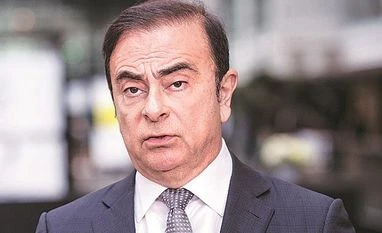Carlos Ghosn’s new routine couldn’t be further from the hard-charging executive lifestyle he enjoyed over the years running a global car alliance. Confined to a detention cell in Tokyo, with limited contact, exercise and strictly regulated meal times, he’s awaiting his fate that prosecutors say could mean a long time in jail for financial misconduct.
Ghosn was whisked away from his corporate jet on Monday and has been under arrest since. Prosecutors provided some insight into the executive’s daily rhythm: eight hours of sleep while he’s in his detention cell, three meals and 30 minutes of prescribed exercise. He’s said to be held at the same facility as the death-row inmates from the Japanese cult that perpetrated the 1995 Tokyo subway sarin attack, many of whom were executed just a few months ago.
While that’s hardly the fate awaiting Ghosn, the prospect of a decade behind bars, as floated by the prosecutor, would be a startling turn for one of the world’s most recognisable corporate leaders. Ghosn was as omnipresent in board rooms--as chairman of Nissan and chief executive officer of Renault--as he was at star-studded conferences. Along the way, he made millions -- but whether those funds were correctly declared and deployed is now under investigation.
Falsely reporting income “is one of the most serious categories of offenses,” said Shin Kukimoto, deputy chief prosecutor at the Tokyo District Public Prosecutors Office. “It is a heavier category of crime than insider trading. I am aware that the eyes and the ears of the world” are on this case.”
The executive is taking the arrest and investigation very badly and doesn’t understand what’s hit him, Yann Rousseau, the Tokyo correspondent for France’s Les Echos magazine told France Info radio on Thursday.
Ghosn’s stamina as he crisscrossed the globe is the stuff of legend, his daily schedule compiled and administered with military precision. Corporate jets and helicopters would facilitate his whirlwind tours from France to Japan to the US, Morocco, Russia, India, or any of the other countries where his companies have factories or executive offices. The allegations surrounding his financial misdeeds are similarly extravagant: from luxury residences dotted around the globe to money funneled into investment funds and family vacations.
Executive prison time is still a rarity in most parts of the world. In Germany, fellow car executive Rupert Stadler, who ran Audi, was jailed in June as part of the probe into diesel-cheating at parent Volkswagen AG. He was freed on bail at the end of October. Another high-profile case in Germany was Thomas Middelhoff, the former CEO of media company Bertelsmann AG and retailer Arcandor AG, who served a total of two years for misappropriating 500,000 euros worth of corporate funds.
Rarely are executives arrested under the glare of the public eye. In Ghosn’s case, officials boarded his jet on the Tokyo airport airfield, but Ghosn wasn’t shown. The notorious perp walk, whereby law-enforcement officials publicly parade an arrested suspect by the media, is more common in the U.S. Financial fraudster Bernard Madoff suffered that fate in 2009, and Dominique Strauss Kahn, the former head of the International Monetary Fund, was displayed to the public in handcuffs after being arrested on allegations of sexual assault.
Former Toyota Motor Corp. executive Julie Hamp left a Tokyo jail in 2015, 20 days after police arrested her for violating Japan’s drug laws.
Ghosn will be represented by Motonari Otsuru, a former head of the special investigation task force of the Tokyo District Public Prosecutors Office, NHK reported earlier today, citing unidentified people familiar. Otsuru oversaw high-profile probes against Livedoor founder Takafumi Horie and Kanebo during his tenure as a prosecutor.
The Franco-Brazilian manager has been visited by the French ambassador to Japan, as well as the Brazilian consul, who was granted a brief moment with Ghosn through a window, AFP reported. Ghosn’s arrest has created considerable political waves, given that the French state is Renault’s biggest shareholder.
As Ghosn awaits the prosecutor’s next move, his arrest has forced both Nissan and Renault to convene board meetings to determine his future at the companies and that of the alliance he oversaw since its creation in 1999. A meeting at Renault two days ago in Paris put new interim leadership in place, while nominally keeping Ghosn on board until more information becomes available, while Nissan convened for a board meeting on Thursday afternoon. The company said it would provide any update from the gathering via the stock exchange.













)
